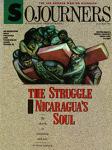David Duke's election to the Louisiana State Legislature should not come as a surprise to anyone. What is surprising is the fact that his election has caused such a tremendous controversy outside of the South.
Duke, a former grand wizard of the Ku Klux Klan, ran as a Republican against John Treen, another Republican. Treen had Lee Atwater and the Republican National Committee (RNC) backing him. The RNC brought out its heaviest artillery in the form of Ronald Reagan and George Bush to endorse Treen. The reason Duke won the election, however, was that he had the will of the people.
Mainstream and progressive press from all over the country, particularly in the East, gave front page coverage to Duke's campaign and the problems it would pose for Lee Atwater should Duke win. After all, this is a "kinder and gentler" nation, and now that the election is over, Willie Horton no longer serves a political purpose. The controversy surrounding Duke's election brings into focus not only America's historical amnesia concerning race relations, but more specifically, its moral schizophrenia.
Less than six months ago, it was Lee Atwater who turned Bush's losing presidential campaign into a winning one by saying the Willie Horton issue--a black convicted murderer who raped a white woman while on prison furlough--would play well in the South. The issue was supposed to have been crime. The image and its implication, however, were racially based.
For his good work, Atwater was made chair of the RNC. Now he says his main priority will be to attract blacks into the Republican Party. Duke's election undermines his efforts and exposes Atwater's, and the Republican Party's, hypocrisy.
No one has been more vocal and vociferous in their opposition to Duke than Atwater. "David Duke is not a Republican as far as I'm concerned. He is a pretender, a charlatan, and a political opportunist, who is looking for any organization he can find to legitimate his views of racial and religious intolerance and bigotry." Atwater even promoted radio spots on black radio stations denouncing Duke.
Atwater's attempt to take the moral high ground on this issue is offensive. And blacks are beginning to let him know. A recent demonstration in Washington, D.C. by 2,000 Howard University students protesting Atwater's election to Howard's Board of Trustees disrupted a convocation ceremony. The students basically said of Atwater what Atwater had said of Duke: Lee Atwater is not a friend of blacks; he is a pretender, a political opportunist. Atwater got the message and resigned.
Immediately following his election, Duke was censured by the RNC, rejected outright like an illegitimate child. They should not have bothered. Although Duke ran as a Republican, he won in spite of the Republican Party.
The issues Duke ran on were consistent with mainstream Republicanism. The difference is that Duke is a former Klansman. This is what made Duke's election news.
Other than his blatantly racist past, Duke had no major differences with his opponent or any other Republicans or southern Democrats who for years have won elections preying on racial insecurities. It was rather an easy transition for Duke from becoming a Klansman to becoming a Republican. It is the most politically and socially acceptable way of being elected with views such as his.
FOR THE LAST 20 YEARS, particularly in presidential politics, the Republicans have played on racial prejudices to attract disaffected white Democrats. The issues of crime, affirmative action, welfare, and the war against drugs have all become code words for racial polarization.
All are emotional issues. All are issues associated with blacks. All are issues that can stir up the greatest amount of resentment toward blacks, and can be twisted into the misconception that blacks are not capable of helping themselves or that not enough is being done to help whites.
These misconceptions are being fed by society. The recent Supreme Court ruling making minority set-aside programs unconstitutional is but one example of this. The message is that blacks and other minorities don't need specific programs to ensure an equal footing in society, that blacks are capable of making it on our own.
Blacks are capable of making it on their own, if given the chance in an environment free of racism. This is not the case, however, and we are paying the price. Our cities are under siege by drugs, incidents of racial violence are becoming commonplace once again, and our children are not learning in school. This scares white America, which needs "heroes." The Republican Party can usually be counted on to supply them: Ronald Reagan, George Bush, and Lee Atwater.
Now, Metairie, Louisiana, has a "hero" of its own: David Duke. It was the misconceived notion of losing power that made Duke so appealing to white voters in Metairie. He fed these fears by dramatizing the inequities of the welfare system, affirmative action programs, the war on drugs, and integrated schools.
Such fears are always fed by economic hard times, and Louisiana is no different. It has a 10 percent unemployment rate, one of the highest in the nation. New Orleans, which is predominantly black, suffers from the whole range of social ills affecting most large cities in the country today. Metairie is a 99.6 percent white-flight suburb of New Orleans. Many of the residents fled crime, drug abuse, and integration. Duke's platform--equal rights for whites--struck a positive nerve in voters.
Metairie, said Duke, is "a microcosm of white America." He is right. During the campaign, Duke told reporters, "There are two ways the liberal Eastern press can handle this. They can say, 'These are real nice people, but they don't know the real David Duke.' Or they can say, 'These people really do know the real David Duke....'" They do know him and they approve.
Anthony A. Parker was assistant news editor of Sojourners when this article appeared.

Got something to say about what you're reading? We value your feedback!
